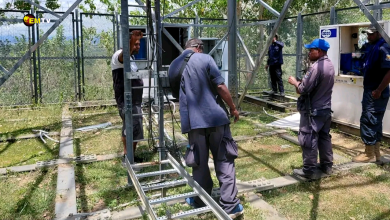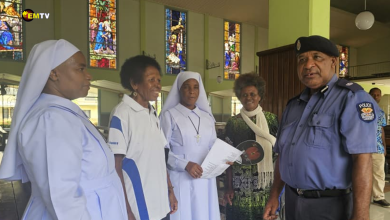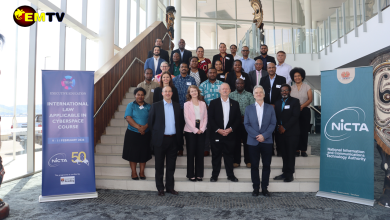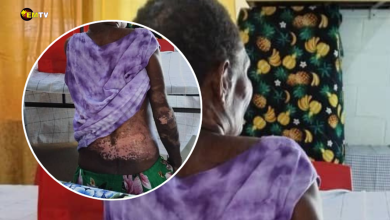Samoa 2019 highlights Australia and China’s soft power play in the Pacific
By Michael Pavitt at the Main Press Centre in Apia
APIA, 15 JULY 2019 (INSIDE THE GAMES) — Locals have labelled the 16th edition of the Pacific Games as “The Miracle Games”.
The logic is clear. Having stepped in as hosts with only an 18-month window to prepare, Samoa has been able to deliver the event on time and so far without incident.
Sponsors were sourced, transport has run smoothly and a two-hour downpour ceased 30 minutes prior to the Opening Ceremony.
In a deeply religious country, where often extravagant churches appear on almost every corner, this was only further proof that the Games have been blessed.
While God may have been responsible for halting the torrential rain – as an opinion piece in the local newspaper credited him with doing so – the source of the Miracle Games has come from another place.
China
The rain which preceded the Ceremony was replaced by a 20-minute firework display at its conclusion, courtesy of the Chinese Government.
It is hard not to find China’s fingerprints across these Games.
Samoan choreographers for the Opening Ceremony received three weeks of training in China to learn the technical details of preparing for large-scale production, while props used in the showpiece were constructed in the country.
Athletes, officials, and media have moved from venue to venue on grey buses which are so new that the protective film on the seats has yet to be removed in many cases. The journeys have largely been smooth, thanks to the newly tarmacked road surface.
If you were left in any doubt as to the benefactors, it is helpfully signposted. The Chinese and Samoan flags stand side-by-side on signs outside many venues with “China Aid” highlighted as being partly responsible for the projects.
A newly-polished multi-purpose gymnasium stands out. The facility feels comparable to the Coomera Indoor Sports Centre, which was built in Gold Coast for last year’s Commonwealth Games. A generous seating capacity leads to the idea that the venue would be capable of hosting other major sporting events.
Had the Games remained in Tonga, which ultimately withdrew over financial concerns, the situation would likely be similar. The Chinese Government had pledged to pay more than £19.6 million for new sporting facilities, including a sports complex, indoor gymnasium, a rugby field, two swimming pools, netball and tennis courts and a lawn bowls field.
The Pacific Games, however, are but a small drop in the ocean when it comes to the influence China is exerting in the region. It was reported last year that 11 Pacific island nations collectively owe China US$1.3 billion in loans, with Samoa considered one of those most indebted.
Tonga’s Prime Minister ‘Akilisi Pohiva last year called for Pacific nations to join forces to seek debt relief from China. The official had warned that buildings could potentially be seized should they prove unable to pay. He later retracted his comments and welcomed China’s ongoing support.
Former Fijian Prime Minister Sitiveni Rabuka has also admitted he thought his country had over-committed to Chinese aid, although Samoa’s Prime Minister Tuilaepa Aiono Sailele Malielegaoi has defended the country’s support and has been optimistic about inviting President Xi Jinping to his nation this year.
China has insisted that they are merely supporting development in the region.
However, it has not prevented suggestions the country could be attempting to persuade Pacific nations to relinquish their recognition of Taiwan, which is still claimed by Beijing.
The Solomon Islands are one of those who do recognize Taiwan. It was confirmed earlier this week that their new national stadium for the 2023 Pacific Games will be constructed by a Taiwanese company, with Taiwan the first to offer support for their hosting of the event.
There are also concerns that China may seek access to airports and ports, following the port of Hambantota being leased to a Chinese company to help reduce Sri Lankan debt.
Regardless of China’s intentions, their influence has led to a response from Australia and New Zealand, viewed as the traditional powers in the region.
Local observers here have suggested there has been a notable step-up in efforts from the two nations with their Pacific island neighbours.
It was notable that Australia’s recently-appointed Minister of Sport Richard Colbeck was present at a pre-Pacific Games event before attending the Opening Ceremony the following day.
Just as China’s influence here has been visible through sport, so is Australia’s response.
The Australian Government outlined a Sports Diplomacy 2030 strategy back in March, building on a foreign policy white paper which concluded: “In the decades ahead Australia will have to work harder to sustain our influence and secure our interests.”
The strategy determined that sport was one of the country’s “key soft power assets”, while asserting the document to be a “global strategy with a Pacific focus”.
Fiji, Nauru, Papua New Guinea, Samoa, Tonga, and Vanuatu were targeted as being recipients of an Australian Sports Partnerships programme to develop sporting initiatives supporting gender equality, disability inclusion and developing leaders.
Increased development funding of AUD$3 million (£1.6 million/US$2.1 million/€1.8 million) per year to help women and girls from Pacific nations to take part in sport and tackle societal issues was among the support outlined.
An Australian Pacific Sports Linkages programme was also among the projects launched as a result, with the promise of Australian sporting teams spending more time in Pacific nations and providing support to enable their teams to compete internationally.
Promising athletes will also be given greater opportunities to train and benefit from high performance training in Australia.
The latter point is not dissimilar to support given by the Chinese, with athletes and coaches from Tonga and Samoa taking part in training camps in China. Vanuatu received the same treatment as they prepared for a home Pacific Mini Games in 2017.
Vanuatu’s visit, in particular, was claimed to have had mixed results at best, with suggestions the cultural differences and hard training regime were not enjoyed by many.
This is viewed as an area where Australia can have an emotional advantage in sporting soft power.
Australia’s Sports Diplomacy strategy noted the rich sporting connections between the country and its Pacific neighbours, with rugby league and rugby union clearly among the sports which have a common interest in the region.
Equally, there has been an increased effort to be viewed as partners through sport, perhaps as a response to suggestions they had previously looked upon the Pacific Island nations as their poor relations.
While Australia and New Zealand have been invited to participate in the Pacific Games in selected sports to help boost the standard, their presence should also not be overlooked in the ongoing efforts to strengthen ties in the region.
As one observer put it to me: China may be able to build the infrastructure, but Australia does not need to build shared sporting interests.
Source: PACNEWS






